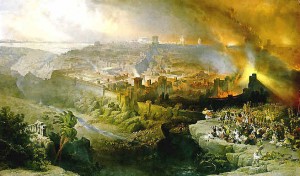 The opposition from the first century Jewish community was the biggest hindrance to the spread of the Gospel in Judea. They constantly opposed and persecuted Jesus, and after Jesus’ death and resurrection, His followers as well. The Jews stoned Stephen, beheaded James the brother of John and killed James, the head of the Church in Jerusalem and the advance of the kingdom of God.
The opposition from the first century Jewish community was the biggest hindrance to the spread of the Gospel in Judea. They constantly opposed and persecuted Jesus, and after Jesus’ death and resurrection, His followers as well. The Jews stoned Stephen, beheaded James the brother of John and killed James, the head of the Church in Jerusalem and the advance of the kingdom of God.
Jesus had previously warned His disciples that judgment was coming on Israel. Jesus told his disciples that the axe had already been laid the root of the tree (Matt. 3:10) and that within a generation the temple would be destroyed. (Matt. 24). As a warning to the judgment to come, Jesus also told His disciples that when they saw Jerusalem surrounded, they were to leave the city immediately. (Luke 21:20-21).
Within a generation, just over thirty years later, the Roman army surrounded Jerusalem and began a 3½ year struggle against the city that would culminate in the destruction of Jerusalem and the temple. In the year AD 70 the Roman general Titus had a siege wall built around Jerusalem cutting off all supplies to Jerusalem and then destroyed the city. Jesus had predicted this would happen as a judgment on Israel for rejecting Him. (Luke 19:41-44).
After the Christians saw Jerusalem surrounded, they left the city (just as Jesus had commanded) and avoided the massacre that followed. Prior to the sacking of Jerusalem, the Jews had been the biggest hindrance to the spread of the gospel in Judea. After God executed His judgment, Christianity began to take hold and spread as many of the Christians who left settled in other areas or returned to Jerusalem where they found the Jewish opposition to the gospel had largely been eradicated.
Philip Schaff describes the effect of the destruction of Jerusalem as follows: “The destruction of Jerusalem, therefore, marks that momentous crisis at which the Christian church as a whole burst forth forever from the chrysalis of Judaism, awoke to a sense of its maturity, and in government and worship at once took its independent stand before the world.” (Schaff, History of the Christian Church, Volume 1, Chapter VI, Section 39).
Judgment is a tool to be wielded exclusively by the hand of God, but it’s wise for Christians to be aware of when it’s occurring because it often provides an opportunity for the advancement of the kingdom of God. GS
